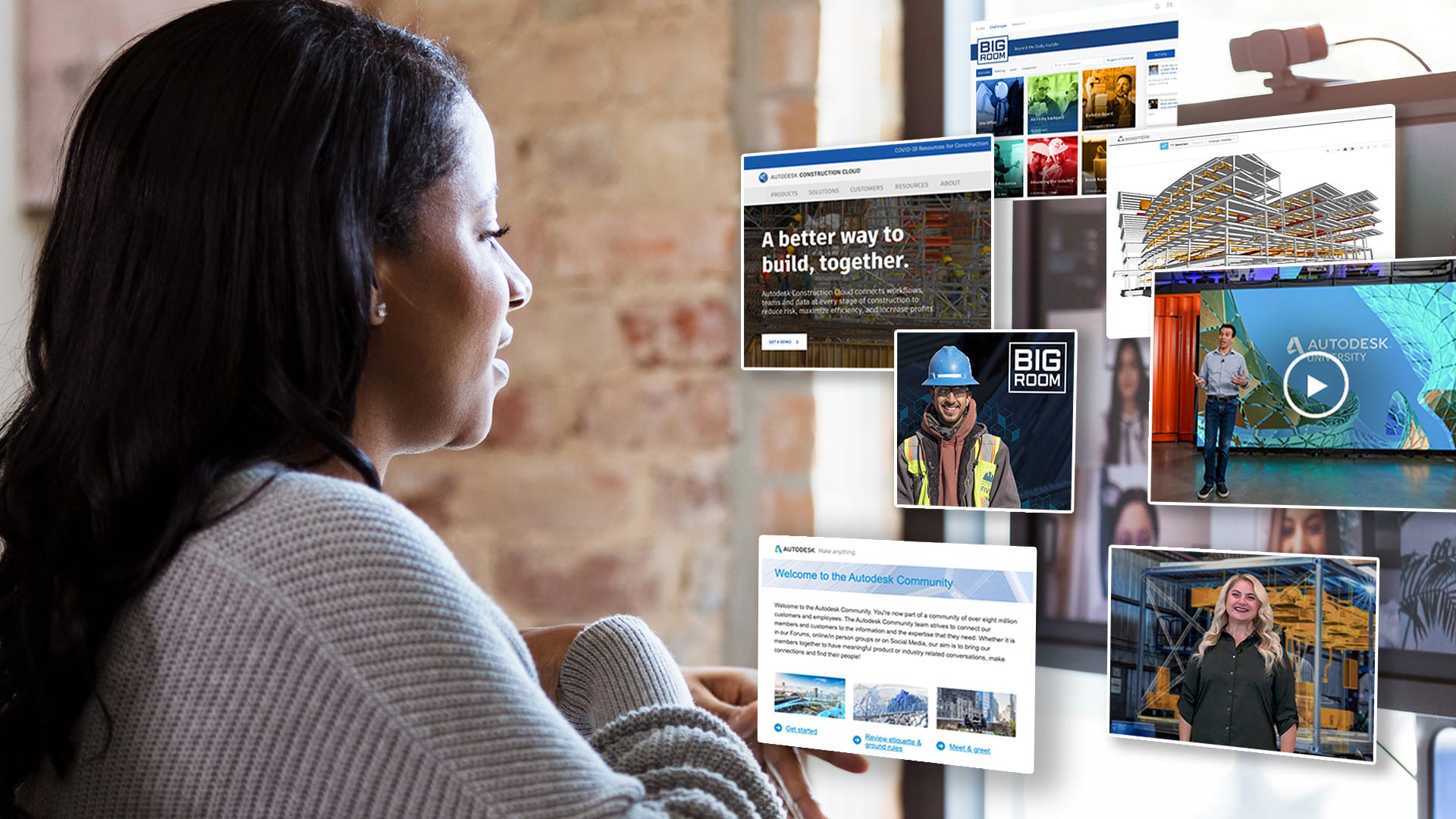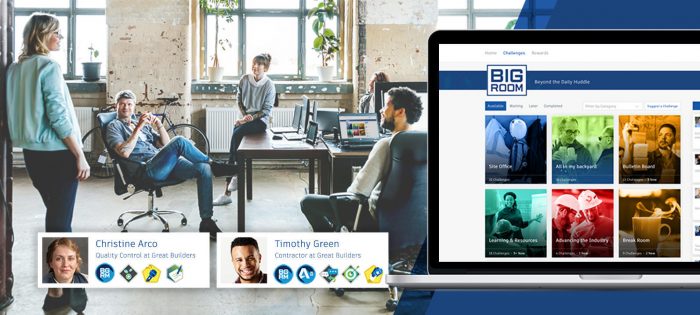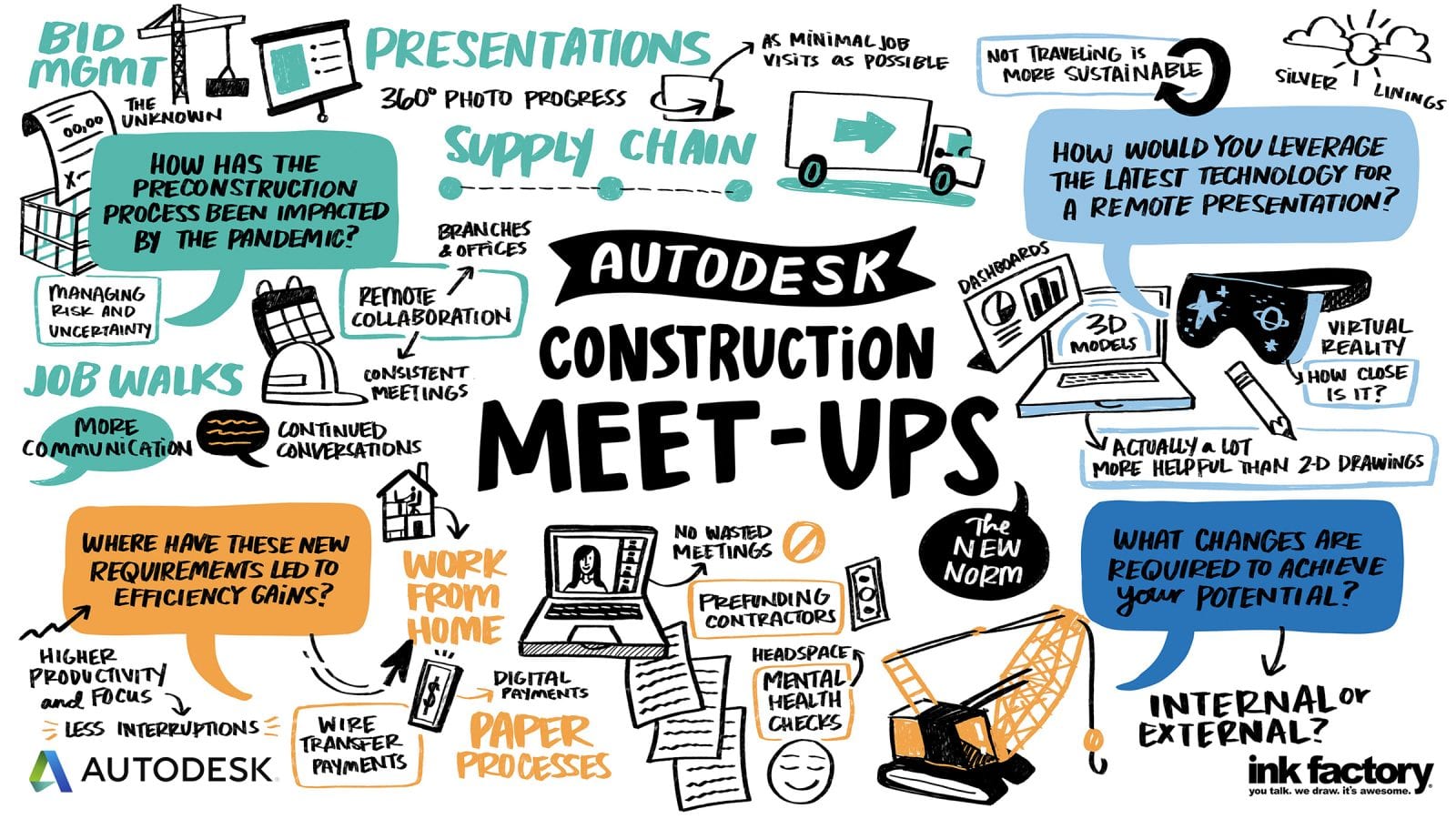Help us improve your experience. See content that is made for you!
See how IBM increased their efficiency by up to 30%!

Help us improve your experience. See content that is made for you!
See how IBM increased their efficiency by up to 30%!


Connecting with other professionals is more challenging than ever due to current circumstances. Nevertheless, meeting, networking, and collaborating with your peers continues to be a vital career practice.
Events, communities, and similar initiatives provide numerous advantages for professionals, and the good news is that you could reap these benefits without being in the same (physical) room as others. Here are four key ways construction professionals can remain connected even when they are remote.
Communities — particularly online communities — have exploded in popularity in recent years, and for good reason: they can be beneficial when building your network, generating new ideas, and finding partnerships.
Research from Higher Logic found that 57% and 63% of online communities members feel seen and heard respectively. Communities also empower participants, with 70% of members providing solutions frequently or all of the time.
That being said, a community is only as good as its members, so find a group that truly resonates with you. Your community should be composed of like-minded individuals in the same industry, who face the same challenges.
Consider The Big Room, an online community that enables you to connect with construction pros and the Autodesk Construction Cloud team. Open to all Autodesk customers, The Big Room is dedicated to helping you expand your network and knowledge of the industry.

You can also find online communities on social media. LinkedIn, for example, is home to thousands of professional groups. You can find groups by entering a relevant keyword (e.g., “construction”) on LinkedIn search, then seeing what comes up.
Just remember to vet these groups and discern whether they can truly uplevel your professional life. Many social media communities end up being forums filled with promotional or marketing content that don’t provide real value to members.
The key is to find communities with guidelines against fluffy content. It’s also essential to have moderators to enforce these rules. The Big Room, for instance, is run by the Autodesk team so you can be sure that the posts and content on the platform all have the potential to improve your career.
While they traditionally happen offline, 2020 saw a boom in virtual meetup events. They can’t fully replace offline functions, but virtual meetups do have one major legup over their offline counterparts: they let people connect from all over the world, giving attendees the chance to “meet up” with peers from other countries.
Autodesk’s Construction Meetups serve as an excellent example of virtual meetups. This bi-monthly event series brings together construction professionals and gives you the opportunity to solve and work through shared pains. In addition to industry peers, these meetups also have experts you can lean on.

Autodesk Construction Meetups let you hear and share stories, struggles, and strategies on how to navigate various challenges in the construction industry.
There are four meetups coming up in January, and we encourage you to participate:
Interested in learning more about Autodesk Construction Meetups? Check out our latest blog.
Like all industries, construction has several trade associations you could join. With local chapters, webinars, resources, and events — there are plenty of ways to stay connected even when everyone is working from home.
Here are some of our top picks of the top professional construction organizations to check out.
Construction Management Association of America (CMAA). This trade organization is dedicated to professional construction management. It has over 16,000 members in multiple sectors (i.e., federal, state, local government and private sectors) as well as various lines of work, including technology, legal, academia, and more.
CMAA has numerous education and training opportunities in the form of courses, live webinars, and e-learning. Check out the organization's calendar here.
American Institute of Constructors (AIC). Established in 1971, the AIC promotes the professional development and recognition of professionals who work in construction management. It offers an AIC Certification Exam which has been completed by more than 25,000 individuals. In addition to the certification, the AIC offers plenty of resources for construction professionals, including events and online education.
Visit the “News” section of its website to keep tabs on any events and opportunities that may come up.
Associated Builders and Contractors (ABC). Representing over 21,000 members, the ABC serves builders and contractors by helping them develop the skills, knowledge, and network they need to win more business and successfully deliver projects. The group has numerous education and training initiatives including webinars, toolkits, apprenticeships and more. The ABC also has a number of upcoming events, which you can check out here.
National Electrical Contractors Association (NECA). Headquartered in Chicago, IL., NECA serves as "the voice of the electrical construction industry." The organization has been around for over a century and focuses its efforts in developing electrical contractors. According to the organization, most of its members qualify as small businesses, though it also has several large and multinational companies.
Follow and learn about upcoming NECA events and meetings here.
Associated General Contractors of America (AGC). The AGC supports the commercial construction industry by advocating for favorable government measures, providing learning opportunities, and giving members access to the resources they need to be successful.
From courses and training to workshops and conferences, the AGC has no shortage of resources and initiatives that can help you learn, network, and grow. Have a look at its national programs and events here.
Mechanical Contractors Association of America (MCAA). The MCAA serves and advocates for those involved in heating, air conditioning, refrigeration, plumbing, piping, and mechanical service. The organization has numerous educational programs and initiatives to help mechanical contractors level up their expertise and network. Some of these initiatives include virtual conferences, seminars, and courses, among others.
Check out the MCAA’s calendar to learn more.
Design-Build Institute of America (DBIA). The DBIA is a national association dedicated to professionals using design-build. The organization is composed of leaders in architecture and engineering, as well as students, academics, and project owners.
The DBIA helps members grow professionally by offering courses, certifications, and conferences.
A survey on conference attendance conducted by the Marine Conservation Congress found that the majority of respondents who attended conferences reported gaining new techniques (56%), skills (64%), and novel ideas (70%) that could advance their careers.
What's more, 89% reported adding new connections and 41% said they were able to re-establish old professional contacts.
Plenty of industry events are now happening virtually, so you can participate in conferences or expos around the world from the comfort of your home.
As mentioned above, trade organizations often host their own conferences, so it may be worthwhile to check them out.
A number of leading technology and solution providers also host industry events. Take Autodesk, which recently concluded Autodesk University, a fully virtual conference that consisted of four full days of keynotes, sessions, meetups, and more.
The best part? You can still access the incredible content even if you weren’t able to attend live.
And if you’re looking for even more events to check out, visit our construction events guide for a list of upcoming industry happenings.
Events, communities, meetups, and networking opportunities may look and feel different in 2020 and the foreseeable future, but they still offer tremendous value. Don’t let the pandemic (or the winter season) stop you from virtually connecting with your construction peers.

May we collect and use your data?
Learn more about the Third Party Services we use and our Privacy Statement.May we collect and use your data to tailor your experience?
Explore the benefits of a customized experience by managing your privacy settings for this site or visit our Privacy Statement to learn more about your options.